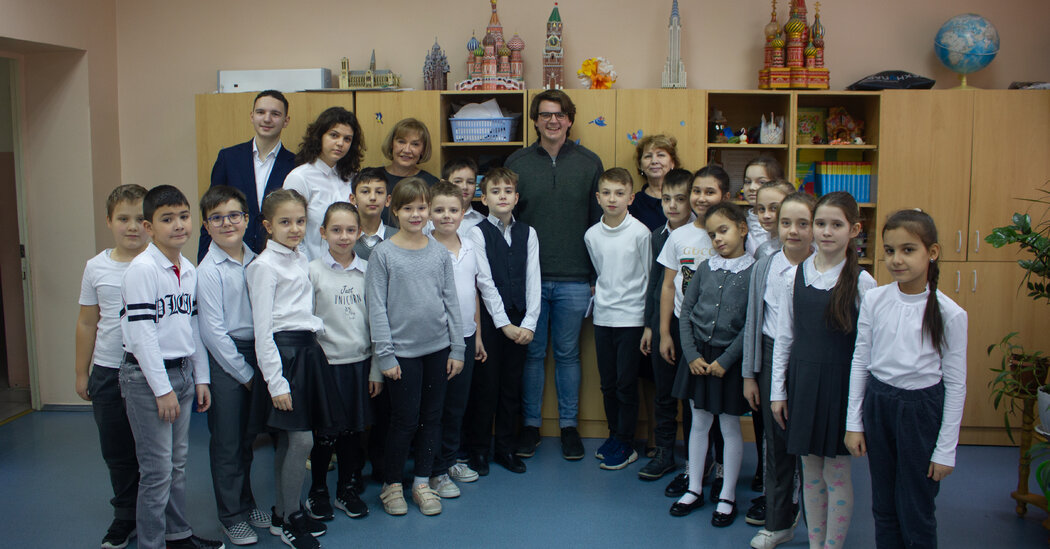Article on Fourth Grader in '60 Inspires Journalism Class

Times Insider explains who we are and what we do, and delivers behind-the-scenes insights into how our journalism comes together.
Two years ago, on a soggy January day at the University of Oregon, Peter Laufer, a journalism professor, picked up a copy of The New York Times and presented his students with a reporting challenge.
He read from a feature at the bottom of Page 2 that highlights an article from The Times’s archives each day. It covered the experience in early 1960 of a fourth grader in Roseburg, Ore., not far from the college. She had written to her congressman for the names of Russian schoolchildren with whom she and her classmates could be pen pals, but the State Department denied the request, fearing they would be influenced by Soviet propaganda. The headline on the article read: “U.S. Bars a Girl’s Plea for Russian Pen Pals.”
“Find that girl!” Mr. Laufer told the class, an exercise designed to teach his students the skill of locating a source and, possibly, a bigger story. He thought she might still be living nearby.
For nine students, that simple instruction turned into a journalism project, which included an on-the-ground reporting trip in Nevada, digging through F.B.I. files from the National Archives and meeting face to face with modern-day fourth graders in southern Russia. This year, they published their findings in a book, “Classroom 15: How the Hoover F.B.I. Censored the Dreams of Innocent Oregon Fourth Graders.”
“It is such a small story, but it resonates so much with the time that it was in,” said Julia Mueller, who worked as the project’s managing editor and wrote a chapter in the book.
Using public records and online databases, the students located the subject of the article, Janice Hall, now married and living near Las Vegas. Her name had been misspelled as “Janis” in the original article, which made it more difficult for the class to locate her.
In 1960, during a tense period of the Cold War, a time when both the United States and the Soviet Union saw every move by the other country as a tactic aimed at world domination, Ms. Hall never had the chance to correspond with Russian students. The reporters were determined to understand why.
They abandoned the syllabus, renamed the course Janice 101 and devoted the rest of the term to unpacking the story.
Each student took a slightly different angle. One examined the fear of communism that had gripped the United States. Another reporter, who was headed to Las Vegas for a spring break trip with her sorority, made a detour to meet Ms. Hall. Yet another interviewed the family of Ray McFetridge, the teacher who had conceived of the pen-pal project and who had died years earlier. Students even obtained the F.B.I. case files on the incident through a Freedom of Information Act request.
“Why wouldn’t you want people to be friends with people across borders?” asked Zack Demars, the lead reporter on the project, outlining the students’ central question.
“I think we discovered that it was because of the level of fear at the time,” he added.
Mr. Laufer, a former NBC News correspondent, thought that a reporter needed to go to Russia to meet with current pupils. He wanted his journalism students to explore what would happen if they tried to connect schoolchildren today.
“We decided that we were not going to leave this hanging,” Mr. Laufer said. “If they couldn’t do it in 1960, we were going to do it in 2020.”
The class decided to take letters written by fourth graders in Yoncalla, Ore., and deliver them to Russian students.
In December 2019, months after the course ended, Mr. Demars took a 13-hour train ride from Moscow to the southern Russian city of Rostov-on-Don, where Mr. Laufer had a contact who agreed to act as a guide.
Mr. Demars met with Russian fourth graders and gave them the letters from their American counterparts. They peppered him with questions: Did he have pets? Did he play sports? What did he think of Ariana Grande?
He also spoke with a group of high schoolers. They discussed American schools and movies and asked to follow him on Instagram. He thinks of these new followers as modern pen pals.
“I don’t talk to them all that often,” he said. “But we interact every now and then, and we have that level of human connection.”
Mr. Demars is now working as a reporter at a small local newspaper in Oregon. During the project, he learned the value of recording individual experiences, which can offer future generations insight into a particular era.
“When I’m out reporting, I’m looking for those things that are commonplace right now but deeply unique to the time period,” he said.
Ms. Hall, 70, said she was amazed to hear from the college students, who are about the age of her grandchildren.
She was also awed by the project, and particularly by Mr. Demars’s persistence: “He hooked up these two fourth grades,” she said, “which is exactly what we were trying to do.”
Published at Thu, 06 May 2021 09:00:17 +0000
Article source: https://www.nytimes.com/2021/05/06/insider/class-russia-children.html